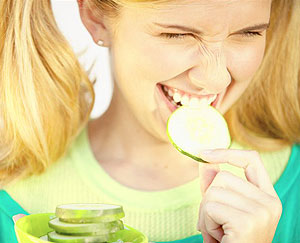Penn Herb Wellness Guide
For Active Girls, D Beats Calcium and Dairy for Bone Building

Building bones for life
The preteen and teenage years are a critical time for bone development. This is when most of the bone mass is laid down, so it’s important that children, especially girls, do everything they can to maximize bone health while they can.
Calcium is a major component of bone, so it follows that the mineral has received a lot of attention for its bone-building ability. But there’s more to strong bones than calcium alone. Vitamins D and K, along with other minerals like boron and zinc also play a role.
A total of 6,712 girls between 9 and 15 years old took part in a study to see just how important three of the “major players” in bone health stood up to scrutiny. Using information gathered from food-frequency questionnaires, investigators estimated how much vitamin D, calcium, and dairy the girls got on a daily basis. Then, they looked at how likely the girls were to develop stress fractures. This type of fracture occurs when the bone isn’t strong enough to take the pressure (or stress) put upon it. Stress fractures are more common in girls who play competitive high-impact sports.
Vitamin D takes the cake
Over the course of seven years, about 4% of the girls developed stress fractures. Almost all of these occurred in girls who participated in high-impact sports—like basketball, running, soccer, tennis, cheerleading, or volleyball—for more than one hour per day.
The amount of dairy in the diet did not seem to affect fracture risk. In fact, girls who consumed three or more servings of dairy per day did not have a lower fracture risk than those who consumed none.
Calcium consumption didn’t seem to lower fracture risk, either. Very active girls with high calcium intake actually had a fracture risk two times greater than girls with the lowest intake. “This unexpected finding warrants further inquiry,” commented the researchers.
This isn’t the first study to suggest that dairy and calcium might not be “the” answer to building strong bones. Another recent investigation showed that while very low calcium intake can hinder bone development, very high amounts of dairy or calcium (as compared with adequate amounts) aren’t correlated with stronger bones or lower fracture risk. Vitamin D was the only factor that seemed to lower the risk of stress fractures. Among very active girls, those with the highest vitamin D intake had a 52% lower chance of stress fractures than those with the lowest intake.
“Our findings support the Institute of Medicine’s recent increase in the Recommended Dietary Allowance for vitamin D for adolescents from 400 IU/d to 600 IU/d,” the team concluded.
Best bets for healthy bones
While the jury is still out on the exact balance of vitamin D, calcium, and dairy thatis needed for strong bones, you can count on a few constants:
Exercise is good. It may seem obvious, but it bears a reminder. Bones cannot form properly if they aren’t exposed to the forces put upon them during weight-bearing exercise. It is essential that young girls get enough of this type of exercise during their bone formative years.
Greens go far. Dark green leafy vegetables like spinach, collards, and bok choy provide a full complement of the vitamins and minerals needed for healthy bones.
Protein is necessary. Protein provides the building blocks for strong bones. But too much might make bones more prone to fractures. About 50 grams of protein per day is a reasonable amount for most young girls. A half-cup of beans contains about ten grams of protein; a quarter-cup of almonds has about 8 grams; and a four-ounce serving of fish has about 25 grams. Vegetarian protein sources, like beans and nuts, may promote better calcium absorption than animal sources.
(Arch Pediatr Adolesc Med;2012:doi:10.1001/archpediatrics.2012.5)
Kimberly Beauchamp, ND, received her doctoral degree from Bastyr University, the nation’s premier academic institution for science-based natural medicine. She co-founded South County Naturopaths in Wakefield, RI, where she practiced whole family care with an emphasis on nutritional counseling, herbal medicine, detoxification, and food allergy identification and treatment. Her blog, Eat Happy, helps take the drama out of healthy eating with real food recipes and nutrition news that you can use. Dr. Beauchamp is a regular contributor to TraceGains Newswire.
Copyright 2025 TraceGains, Inc. All rights reserved.


